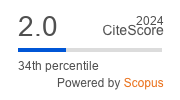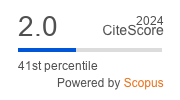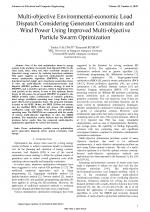| 4/2020 - 1 | View TOC | « Previous Article | Next Article » |
Multi-objective Environmental-economic Load Dispatch Considering Generator Constraints and Wind Power Using Improved Multi-objective Particle Swarm OptimizationYALCINOZ, T. |
| Extra paper information in |
| Click to see author's profile in |
| Download PDF |
Author keywords
optimization, particle swarm optimization, power generation dispatch, power system economics, wind energy
References keywords
power(29), dispatch(29), economic(26), optimization(21), swarm(20), algorithm(13), energy(11), objective(9), multiobjective(8), multi(8)
Blue keywords are present in both the references section and the paper title.
About this article
Date of Publication: 2020-11-30
Volume 20, Issue 4, Year 2020, On page(s): 3 - 10
ISSN: 1582-7445, e-ISSN: 1844-7600
Digital Object Identifier: 10.4316/AECE.2020.04001
Web of Science Accession Number: 000594393400001
SCOPUS ID: 85098149157
Abstract
One of the vital optimization issues in energy systems is the problem of economic load dispatch (ED). On the other hand, solar, wind, and other renewable energies are important energy sources for reducing hazardous emissions. This paper suggests an improved multi-objective particle swarm optimization algorithm (IMOPSO) that uses a functional inertial weight and a functional constriction factor to solve the multi-objective environmental-economic load dispatch (MEED) problem. A mutation strategy is used in IMOPSO, and a mutation operator, which is implemented for each particle in the swarm, is used to find optimum Pareto fronts. In this paper, the proposed IMOPSO is applied to the MEED problem under consideration of emission pollution, wind energy, prohibited operating zone, ramp limits, valve point effects, and transmission losses. The proposed technique is tested on the IEEE 30-bus, the IEEE 118-bus test system, and the modified IEEE 118-bus test system with emission coefficients, ramp rate limits, wind power, and prohibited operating zone. The IMOPSOs are compared with the results of various multi-objective algorithms to solve the MEED problem. The simulation results indicate that the IMOPSO produces better results than the compared multi-objective optimization algorithms for various test systems. |
| References | | | Cited By |
Web of Science® Times Cited: 6 [View]
View record in Web of Science® [View]
View Related Records® [View]
Updated 2 weeks, 5 days ago
SCOPUS® Times Cited: 7
View record in SCOPUS® [Free preview]
View citations in SCOPUS® [Free preview]
[1] Optimal power flow solution using opposition based modified Rao’s algorithm, Shaik, Mabhu Jani, Kottala, Padma, Rama Sudha, K, Engineering Research Express, ISSN 2631-8695, Issue 4, Volume 5, 2023.
Digital Object Identifier: 10.1088/2631-8695/acfc15 [CrossRef]
[2] Generalized Model of Economic Dispatch Optimization as an Educational Tool for Management of Energy Systems, PAPAZIS, S. A., BAKOS, G. C., Advances in Electrical and Computer Engineering, ISSN 1582-7445, Issue 2, Volume 21, 2021.
Digital Object Identifier: 10.4316/AECE.2021.02009 [CrossRef] [Full text]
[3] Achieving Sustainability and Cost-Effectiveness in Power Generation: Multi-Objective Dispatch of Solar, Wind, and Hydro Units, Lotfi Akbarabadi, Mohammad, Sirjani, Reza, Sustainability, ISSN 2071-1050, Issue 3, Volume 15, 2023.
Digital Object Identifier: 10.3390/su15032407 [CrossRef]
[4] The Multi-Objective Optimal Scheduling of the Water–Wind–Light Complementary System Based on an Improved Pigeon Flock Algorithm, Wang, Kangping, Ge, Pengjiang, Duan, Naixin, Wang, Jili, Lv, Jinli, Liu, Meng, Wang, Bin, Energies, ISSN 1996-1073, Issue 19, Volume 16, 2023.
Digital Object Identifier: 10.3390/en16196787 [CrossRef]
[5] Multi-objective Approach for Dynamic Economic Emission Dispatch Problem Considering Power System Reliability and Transmission Loss Prediction Using Cascaded Forward Neural Network, Nagulsamy, Nalini, Chandrasekaran, Kumar, Manoharan, Premkumar, Derebew, Bizuwork, International Journal of Computational Intelligence Systems, ISSN 1875-6883, Issue 1, Volume 17, 2024.
Digital Object Identifier: 10.1007/s44196-024-00604-7 [CrossRef]
[6] A hybrid differential evolution for multi-objective optimisation problems, Song, Erping, Li, Hecheng, Connection Science, ISSN 0954-0091, Issue 1, Volume 34, 2022.
Digital Object Identifier: 10.1080/09540091.2021.1984396 [CrossRef]
Disclaimer: All information displayed above was retrieved by using remote connections to respective databases. For the best user experience, we update all data by using background processes, and use caches in order to reduce the load on the servers we retrieve the information from. As we have no control on the availability of the database servers and sometimes the Internet connectivity may be affected, we do not guarantee the information is correct or complete. For the most accurate data, please always consult the database sites directly. Some external links require authentication or an institutional subscription.
Web of Science® is a registered trademark of Clarivate Analytics, Scopus® is a registered trademark of Elsevier B.V., other product names, company names, brand names, trademarks and logos are the property of their respective owners.
Faculty of Electrical Engineering and Computer Science
Stefan cel Mare University of Suceava, Romania
All rights reserved: Advances in Electrical and Computer Engineering is a registered trademark of the Stefan cel Mare University of Suceava. No part of this publication may be reproduced, stored in a retrieval system, photocopied, recorded or archived, without the written permission from the Editor. When authors submit their papers for publication, they agree that the copyright for their article be transferred to the Faculty of Electrical Engineering and Computer Science, Stefan cel Mare University of Suceava, Romania, if and only if the articles are accepted for publication. The copyright covers the exclusive rights to reproduce and distribute the article, including reprints and translations.
Permission for other use: The copyright owner's consent does not extend to copying for general distribution, for promotion, for creating new works, or for resale. Specific written permission must be obtained from the Editor for such copying. Direct linking to files hosted on this website is strictly prohibited.
Disclaimer: Whilst every effort is made by the publishers and editorial board to see that no inaccurate or misleading data, opinions or statements appear in this journal, they wish to make it clear that all information and opinions formulated in the articles, as well as linguistic accuracy, are the sole responsibility of the author.



